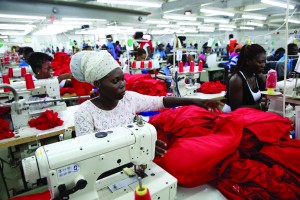 Captains of industry have expressed concern over the high interest rates being charged by commercials banks in the country.
Captains of industry have expressed concern over the high interest rates being charged by commercials banks in the country.
They are, therefore, warning that if nothing was done to reverse the trend, it may result in the collapse of their businesses and subsequent loss of jobs.
Quoting statistics from the Asia Development Bank to support their arguments, they stated that “lending rates in Indonesia average 11.7%; South Korea’s is about 4.6%. In the USA, it is possible to obtain a car loan at 0%, but in Ghana, lending rates range from 28% to 35% in the formal financial institutions, and 45% to 120% in the microfinance institutions, depending on the sector they are lending to.”
The presidents of the Association of Ghana Industries (AGI), Ghana National Chamber of Commerce and Industries (GNCCI), Ghana Union of Traders’ Association (GUTA), James Asare-Adjei, Seth Agyei Baah, and George Ofori respectively, expressed the concern at the Ministry of Trade and Industry and Institute of Economic Affairs (IEA), a leading economic think tank, forum on high interest rates in Accra.
Buttressing their concern, the Minister of Trade and Industry, Dr. Ekwow Spio-Garbarh, said the debate was taking place “at a time when global interest rates are unreasonably low, with most Organisation for Economic Co-operation and Development (OECD) countries enjoying average interest rates of less than 5%, with countries such as Norway reporting Negative Interest Rates, and many European and Asia countries reporting interest rates from 0%-5%.”
He stated: “The persistently high interest regime in Ghana, characterised by high bank lending rates and the large spread between lending and deposit rates, have dire consequences for the sustainability and long term prospects of our economic growth.”
“High interest rates and high cost of credit tend to translate into a high cost of doing business. This leads to increases in the cost of production, which are then passed on to consumers in the form of higher prices of goods and services. This cycle, by definition, is inflationary. This stifles the expansion of industrial output and affects the overall national growth as well. In this way, high interest rates and high cost of credit, which increase the cost of doing business in Ghana, makes our economy less competitive in attracting investments,” Dr. Spio-Garbrah added.
The implication of all these, he noted, “is that efforts aimed at accelerating our economic transformation of our economy to move the country from the current low middle income status to full middle income status, and create decent jobs for improved livelihood, through an export-led industrialisation strategy, is being seriously impaired and undermined.
“Furthermore, as government is the single largest borrower in the economy, high interest rates only add to the government’s woes of budget deficits, accompanied by negative balance of payments and balance of trade. Government, as the largest single debtor in Ghana, should also be the most and the keenest at finding a quick solution.”
Perhaps, he said, none of them here has a better appreciation of what high interest rates and high cost of credit are doing to Ghanaian businesses and the national competitiveness than the industrialists and friends within their business community.
It should, therefore, be understandable that the key private sector operators, who bear the brunt of the negative impact, such as the members of the AGI, GUTA, GNCCI, and, particularly, operators in the SME sector, are the ones most vocal in condemning the government, as policy makers and regulators, or financial sector operators, for the high cost of credit in Ghana, Dr. Spio-Garbrah stated.
Major causes of high interest rates
Presenting a paper on the causes and solutions of high cost to credit in Ghana, a Senior Economist at the IEA, Dr. John Kwakye, identified excessive government borrowing, structure of the economy, high operational cost of banks, monetary policy, depreciation, and inflation as the major causes of high interest rates in the country.
He, therefore, blamed these on the commercial banks, the Bank of Ghana (BoG), present and successive governments, as well as borrowers for the high interest rates in the country.
“I am not leaving anybody out, government, borrowers, banks, regulators are all partly to be blamed for the high rates.”
According to the renowned economist, monetary policy also contributes to the high cost of credit, interest rates is usually related to inflation, so with our double digit inflation, it should not surprise us that we have high interest rates.
“Because we have experienced macroeconomic stability, most of our history monetary policy has tendered to be largely restrictive, this means that the BoG’s policy rate has been high most of the time, currently at 21 percent; this sets the stage for other interest rates; there is no way other lending rates will be lower than this figure,” Dr. Kwakye argued.
Another renowned economist, Kwame Pianim, who chaired the discussion, noted that the failure of the government to pay attention to macroeconomic indices could be as disastrous as taking a purgative and going to sleep.
“You will wake up in a mess,” he warned. He recalled that when he worked at the Finance Ministry in the 1970s, interest rate was 7%, and inflation rate 3%.
“Is it believable in Ghana now?” Mr. Pianim questioned. But advised: “If we take care of the macroeconomics…everything else will be added.”
Mr. Pianim recalled how businesses in patriotic solidarity paid the painful price of remaining faithful to the cedi, after the government directed that all transactions in dollars should cease.
“We woke up one day, the cedi had depreciated significantly, you had lost 40% of the dollar equivalent of your shareholder fund,” the renowned Economist lamented.
Contributing to the discussion, Dr. Joe Abbey, Executive Director at the Centre for Policy Analysis (CEPA), a leading economic think-tank, asked the government to reduce the high fiscal and current account deficits, which will subsequently, lead to a reduction in the cost of credit.
“The one thing peculiar to Ghana is that we have situations of high fiscal and current account deficit, which come essentially from the operations of government, so if we are going to get the job done, we must stop these quibblings and get down with the job,” he told the forum.
BoG must wake up from its slumber
The Head of the Economics Division at the Institute of Statistical, Social Economic and Research (ISSER), Dr. Charles Ackah, called on the Bank of Ghana (BoG) to wake up from its slumber and step up its regulatory roles.
Most of Ghana’s economic challenges are as a result of the policy rates and high borrowing by the government, which are mostly regulated by the BoG, he stated.
Dr. Ackah regretted that the inability of the BoG to perform its supervisory role of regulating the activities of micro enterprises has partly contributed to the challenges, saying, “I was talking to some micro enterprises, and they are borrowing at 10 percent per month, and the Bank of Ghana sits down, government sits down, as if nobody can do anything about it.”
Measures to address the high interest rates menace
The Minister of Trade and Industry suggested that the promotion of Made in Ghana Goods being championed by the Ministry and the private sector could help reduce interest rates by reducing the demand for foreign products, reducing the demand for foreign exchange, reducing balance of payments deficits, and, therefore, budget deficits; and, therefore, the high levels of government borrowing.
Beyond discussing the cost of credit, Dr. Spio-Garbrah maintained that the MoTI-IEA forum shall also take up issues surrounding sector lending practices, and examine what it would take for banks in Ghana to offer longer maturities, and to lend more to the productive sectors of manufacturing and agriculture, as contrasted with short term loans to importers.
“We need to collectively re-orient the incentive system in this economy to move away from importers to manufacturers.”
He believes that they can all work together, so that by the end of the deliberations, a clear roadmap could be drawn up in the form of Forum Recommendations, as well as an Implementation Strategy that will enable them to collectively address, once and for all, this major national challenge of the high cost of credit on the Ghanaian economy.
African Eye News.com





